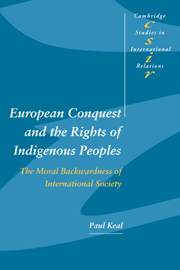 European Conquest and the Rights of Indigenous Peoples
European Conquest and the Rights of Indigenous Peoples Published online by Cambridge University Press: 03 December 2009
The preceding chapters have successively discussed European representations of non-Europeans, the way first nations were dispossessed of their property, and the struggle to have rights to land and self-determination restored to them. This chapter concerns some political and moral issues arising from European conquest. In relation to the preceding chapters three clusters of problems stand out as the most important: the ethics of constructing ‘others’; the idea that ‘the West’ bears a collective responsibility for historic injustices that need to be redressed; the moral legitimacy of states with significant unresolved issues affecting their indigenous populations, leading in turn to the question of whether international society is legitimate. The underlying premise of the chapter is that if international society is to be regarded as worth preserving, either as an idea or in practice, then it must be a society that defends the whole community of humankind and not just the particular interests of dominant groups in particular states. This harks back to the suggestion in Chapter 2 that international society has a universal moral basis so long as it fosters the well-being of individuals everywhere, which is an argument that will be revisited in Chapter 6.
This chapter is arranged in three parts corresponding with the issues mentioned above. The first discusses the harms that can result from constructing others and which extend beyond colonial pasts and indigenous peoples to contemporary cross-civilisational relations in general.
To save this book to your Kindle, first ensure [email protected] is added to your Approved Personal Document E-mail List under your Personal Document Settings on the Manage Your Content and Devices page of your Amazon account. Then enter the ‘name’ part of your Kindle email address below. Find out more about saving to your Kindle.
Note you can select to save to either the @free.kindle.com or @kindle.com variations. ‘@free.kindle.com’ emails are free but can only be saved to your device when it is connected to wi-fi. ‘@kindle.com’ emails can be delivered even when you are not connected to wi-fi, but note that service fees apply.
Find out more about the Kindle Personal Document Service.
To save content items to your account, please confirm that you agree to abide by our usage policies. If this is the first time you use this feature, you will be asked to authorise Cambridge Core to connect with your account. Find out more about saving content to Dropbox.
To save content items to your account, please confirm that you agree to abide by our usage policies. If this is the first time you use this feature, you will be asked to authorise Cambridge Core to connect with your account. Find out more about saving content to Google Drive.